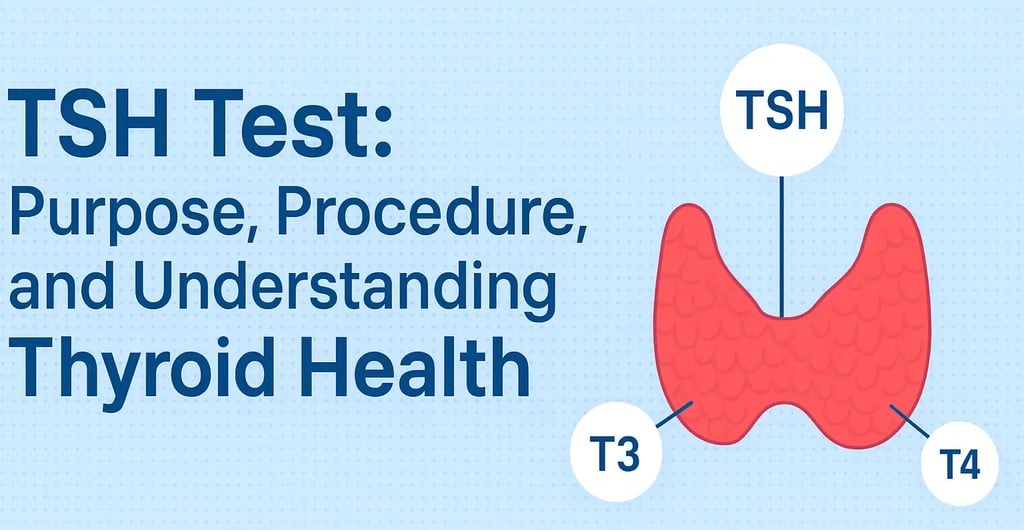TSH Test: Purpose, Procedure, and Understanding Thyroid Health
Learn what the TSH test is, how it’s performed, and how results are interpreted. Discover its role in diagnosing hypothyroidism, hyperthyroidism, and overall thyroid health.


What is the TSH Test?
The TSH test (Thyroid-Stimulating Hormone test) is a vital thyroid function test used to measure hormone levels that regulate thyroid activity. Produced by the pituitary gland, TSH controls the thyroid’s production of thyroxine (T4) and triiodothyronine (T3). Monitoring TSH levels helps doctors evaluate whether the thyroid gland is functioning normally and detect issues such as hypothyroidism (underactive thyroid) or hyperthyroidism (overactive thyroid).
How the TSH Test is Conducted
The TSH blood test is simple, quick, and minimally invasive. Patients usually do not need to fast or follow special preparations unless advised by their doctor. However, it’s important to inform healthcare providers about any medications or supplements that may affect thyroid function.
During the procedure:
A healthcare professional selects a vein in the arm.
The area is cleaned with antiseptic.
Blood is drawn using a small needle and collected in a vial.
The test typically takes only a few minutes. Patients may feel slight discomfort or bruising at the injection site, but complications are rare.
Once collected, the sample is sent to a lab. Results are generally available within a few days, and your doctor will interpret them in the context of your overall thyroid health and any symptoms.
Interpreting TSH Test Results
Interpreting results is essential for understanding thyroid function:
High TSH levels → May indicate hypothyroidism (underactive thyroid). Symptoms include fatigue, weight gain, and depression.
Low TSH levels → May point to hyperthyroidism (overactive thyroid). Symptoms include weight loss, anxiety, and rapid heartbeat.
Normal reference ranges are generally 0.4 to 4.0 mIU/L, but these may vary by laboratory, age, and health status. Additional tests such as Free T4 and Free T3 are often recommended to confirm diagnosis and provide a complete thyroid profile.
Other factors that may influence results include pregnancy, medications, and pituitary disorders. Doctors may order follow-up tests to ensure accurate diagnosis and treatment.
The Role of TSH Tests in Thyroid Health Management
The TSH test is crucial for monitoring and managing thyroid disorders like hypothyroidism and hyperthyroidism. Regular screening allows healthcare providers to:
Track thyroid gland performance
Adjust treatment plans
Prevent overtreatment or undertreatment
Improve patient outcomes
Since TSH levels can fluctuate due to lifestyle and health conditions, doctors often use this test alongside other thyroid function tests for a holistic evaluation.
Ultimately, the TSH test remains one of the most reliable tools for maintaining long-term thyroid health and guiding effective treatment strategies.
